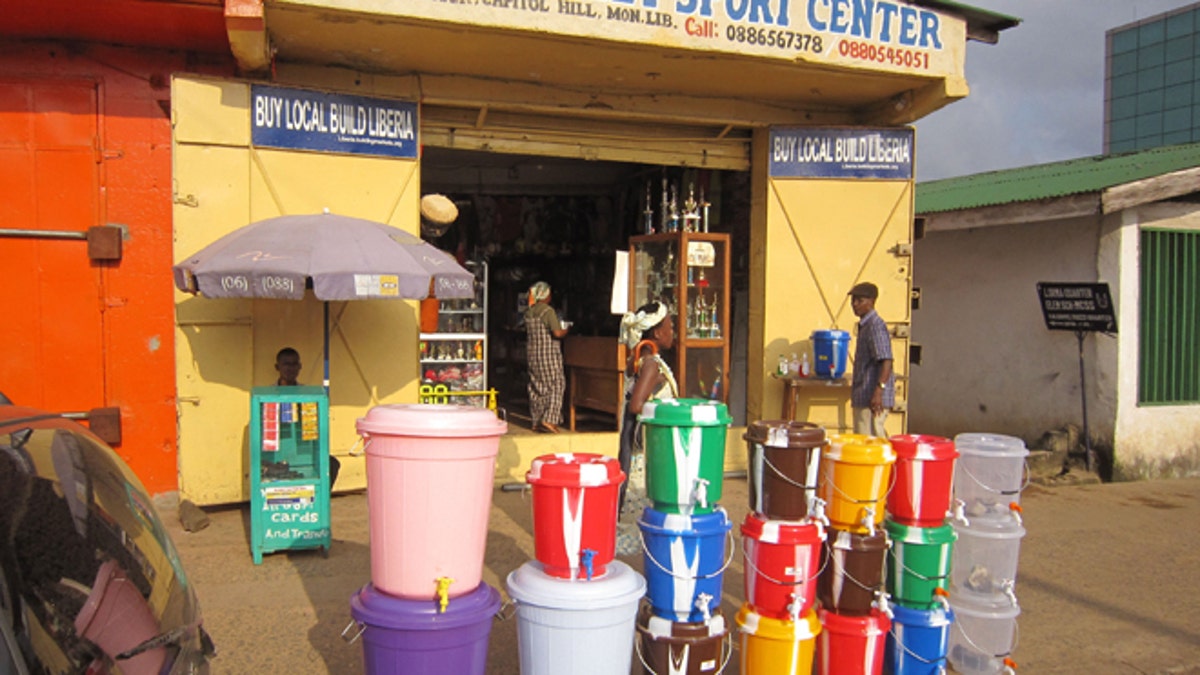
Aug. 4, 2014: According to local reports the sale of water buckets has increased dramatically, because they are used by Liberian people to fill with disinfectant and to wash their hands to prevent the spread of the deadly Ebola virus, in the city of Monrovia, Liberia. Dozens of local doctors and medical staff are among the dead, as foreign aid workers are arriving to help fight the Ebola outbreak and the Liberian government Information Minister Lewis Brown announced that all Ebola victims are to be cremated as fears rise that the disease could spread with bodies being buried in residential areas. (AP/Jonathan Paye-Layleh)
Every 30-day delay in isolating Ebola patients will cause a tripling in daily cases of the deadly epidemic sweeping West Africa, according to new forecasts released on Tuesday.
As world leaders gather in New York this week for the United Nations’ annual meeting, U.N. Secretary General Ban Ki-Moon has called a special Ebola session to scale up international efforts to fight the deadly virus that has infected at least 5,500 people and claimed more than 2,700 lives in five countries.
Aid agencies and nonprofit groups working on the Ebola frontlines in worst-hit Liberia, Sierra Leone and Guinea said they urgently need world leaders at the session to deliver on three fronts: more isolation centers, both for intensive medical care and for basic care in the communities; more healthcare workers; and more equipment, protective gear, disinfectant and other supplies.
“This is the time for action,” said Margaret Aguirre, head of global initiatives at the nonprofit International Medical Corps, which provides healthcare training worldwide.
“We hope the U.N. is able to mobilize additional financial and technical support, and increase pressure on member states to step up their direct and multilateral contributions to fight this global health disaster.”
Without significantly faster steps to control the spread of the highly contagious hemorrhagic fever, which is transmitted via body fluids, the case load in Liberia and Sierra Leone could top half a million by late January and possibly reach 1.4 million people, the U.S. Centers for Disease Control and Prevention (CDC) said in releasing a forecasting tool for calculating the trajectory of the disease and the impact of interventions.
“For each day we are not effectively isolating people, not only are people dying, not only are they infecting others but also the job of getting it under control is much, much more difficult,” CDC Director Tom Frieden said in a media teleconference.
If approximately 70 percent of patients are hospitalized or in controlled settings, and public health measures such as safe burial are used, the disease can be brought under control. Otherwise cases will triple every 30 days, the tool showed.
COMMUNITY CARE
While international efforts so far have focused on specialized Ebola treatment units, nonprofit groups say they are not enough. They will take at least one month to build and to staff. Moreover, they will be located in regional centers requiring people in rural areas to travel long distances to reach them, which increases the risks of transmission.
Over the past week, government officials have started discussing less intensive community-based care, where the sick are isolated in their homes or a local school building, and one family member is designated as their sole caretaker. Daily deliveries of food and water, oral rehydration, painkillers, gloves, disinfectant and clean water are brought to the door and contaminated items are removed.
“There are not going to be enough beds fast enough in treatment centers and not enough staff to run them. If we don't want these scary numbers to come true, we have to find ways to step up the response and this is one way," said Carolyn Miles, president of Save the Children Fund US, who is attending U.N. Ebola meetings in New York.
Gayle Smith, the White House’s senior director for global development on the National Security Council, said community care will be part of the response. Officials have identified 400,000 of the most vulnerable households and are working with community leaders to deliver healthcare kits, she said.
Enlisting the help of respected local leaders who can lead local efforts and spread the prevention message within their communities is critically important to breaking the arc of the disease, said Emmanuel D’Harcourt, senior health director at the International Rescue Committee aid organization.
Fear is widespread, distrust of governments high and anger over foreigners arriving in layers of protective gear leading away their loved ones to medical units they cannot enter is undermining global efforts to control the disease, he said.
IRC has more than 300 emergency relief and health workers in the region, and D'Harcourt has just returned from Liberia. World leaders at the U.N. urgently need to consider ways to fund local outreach alongside the complex logistics and medical assistance.
"Days matter here,” he said.








































